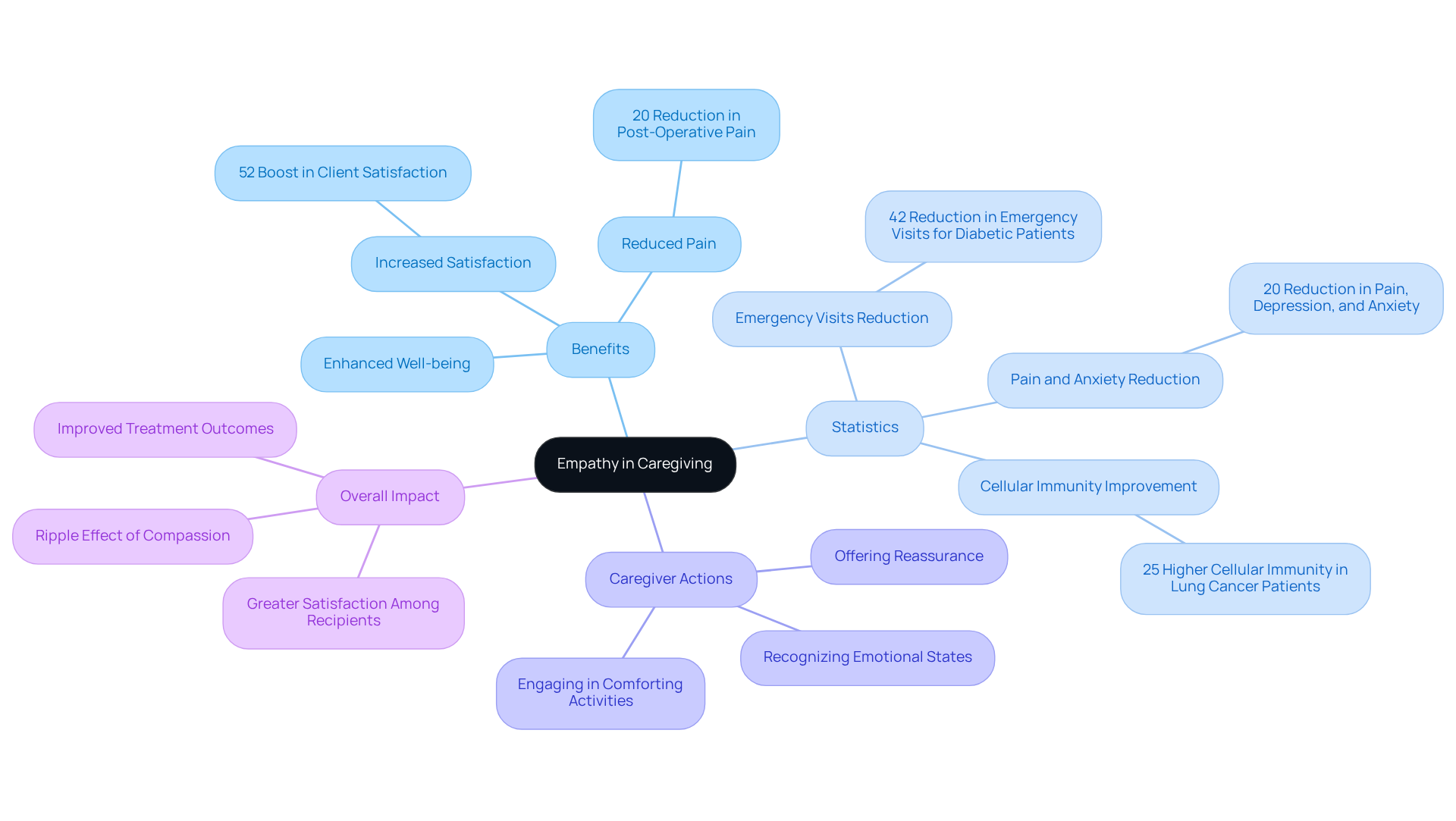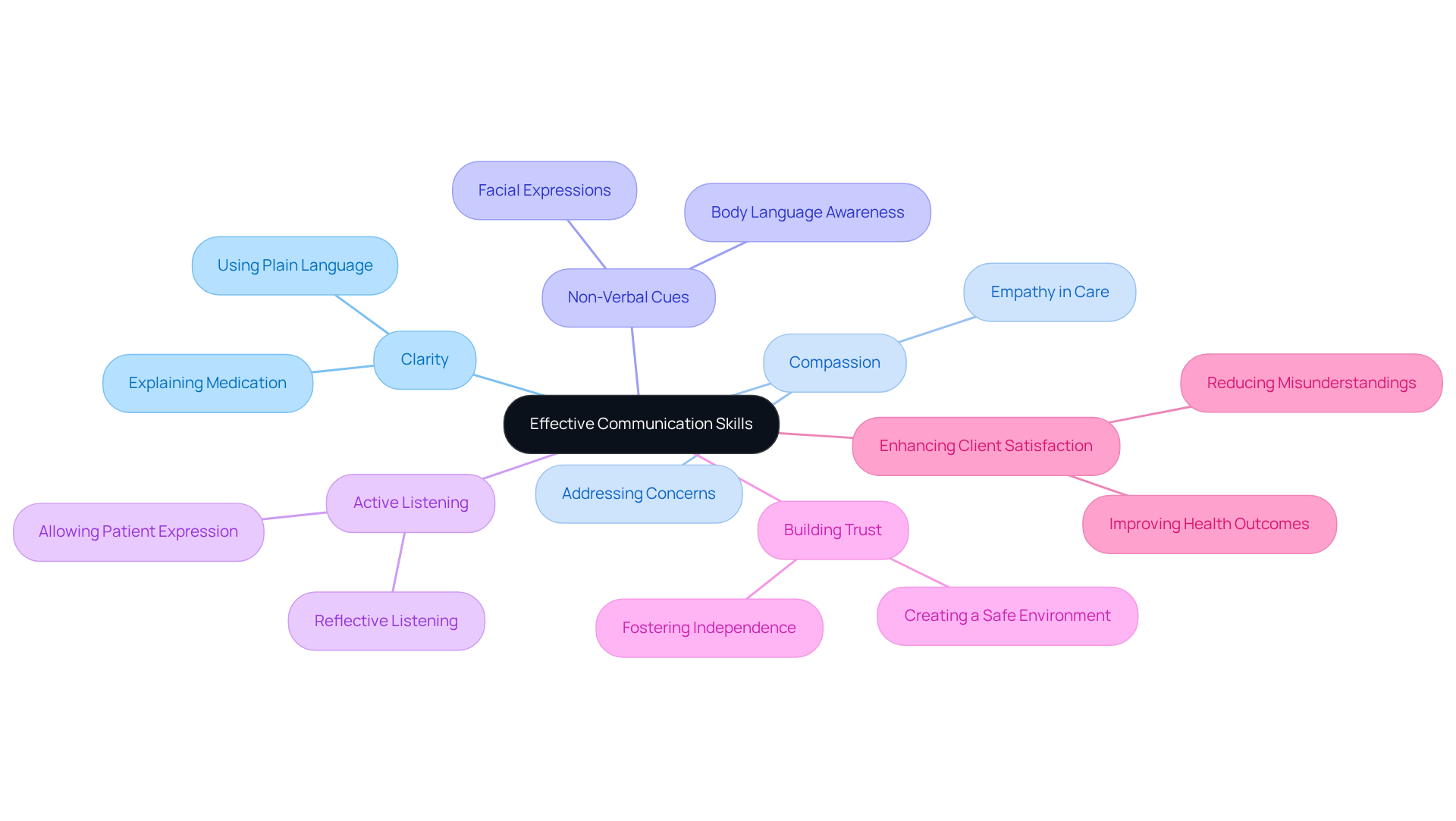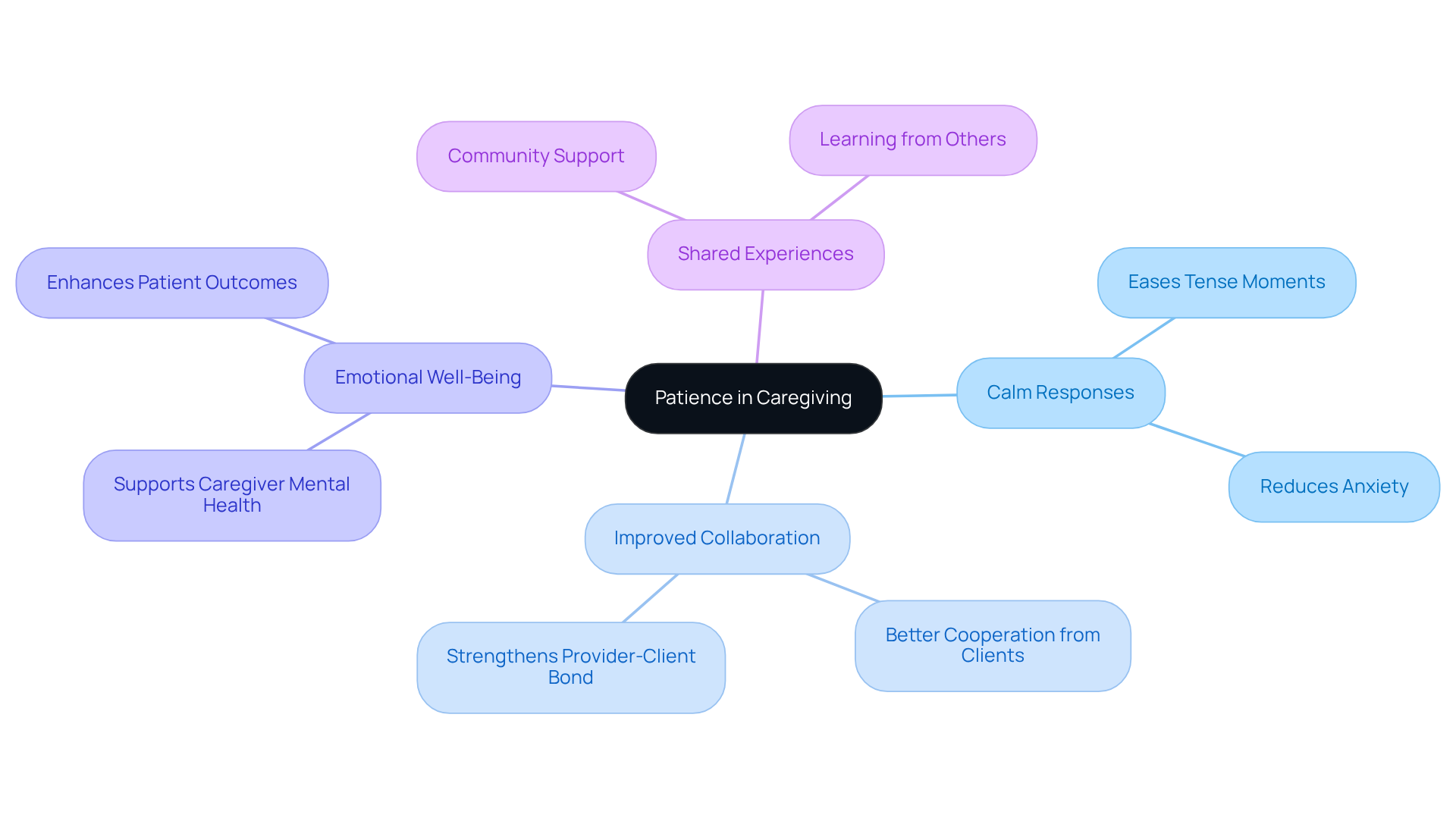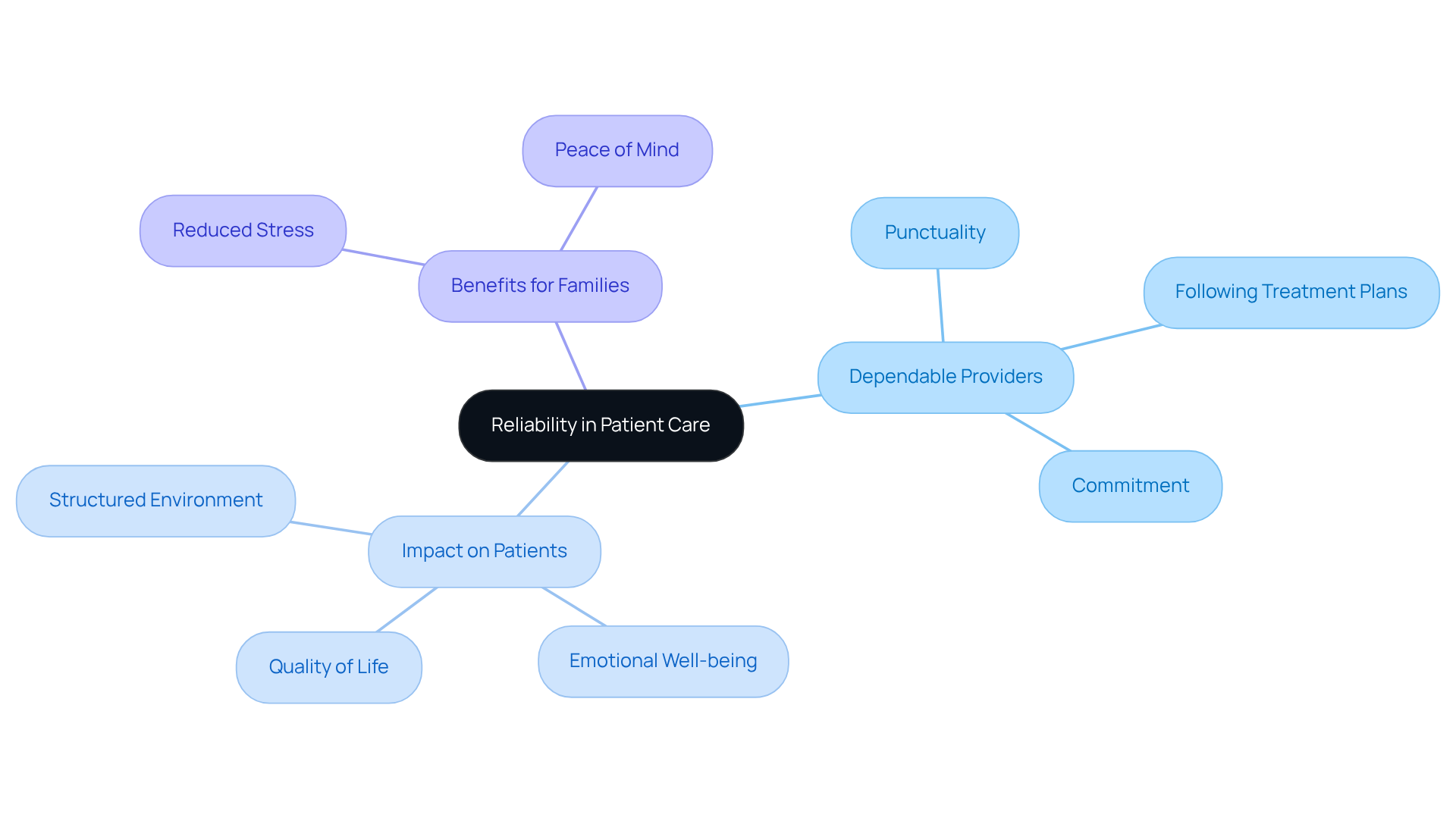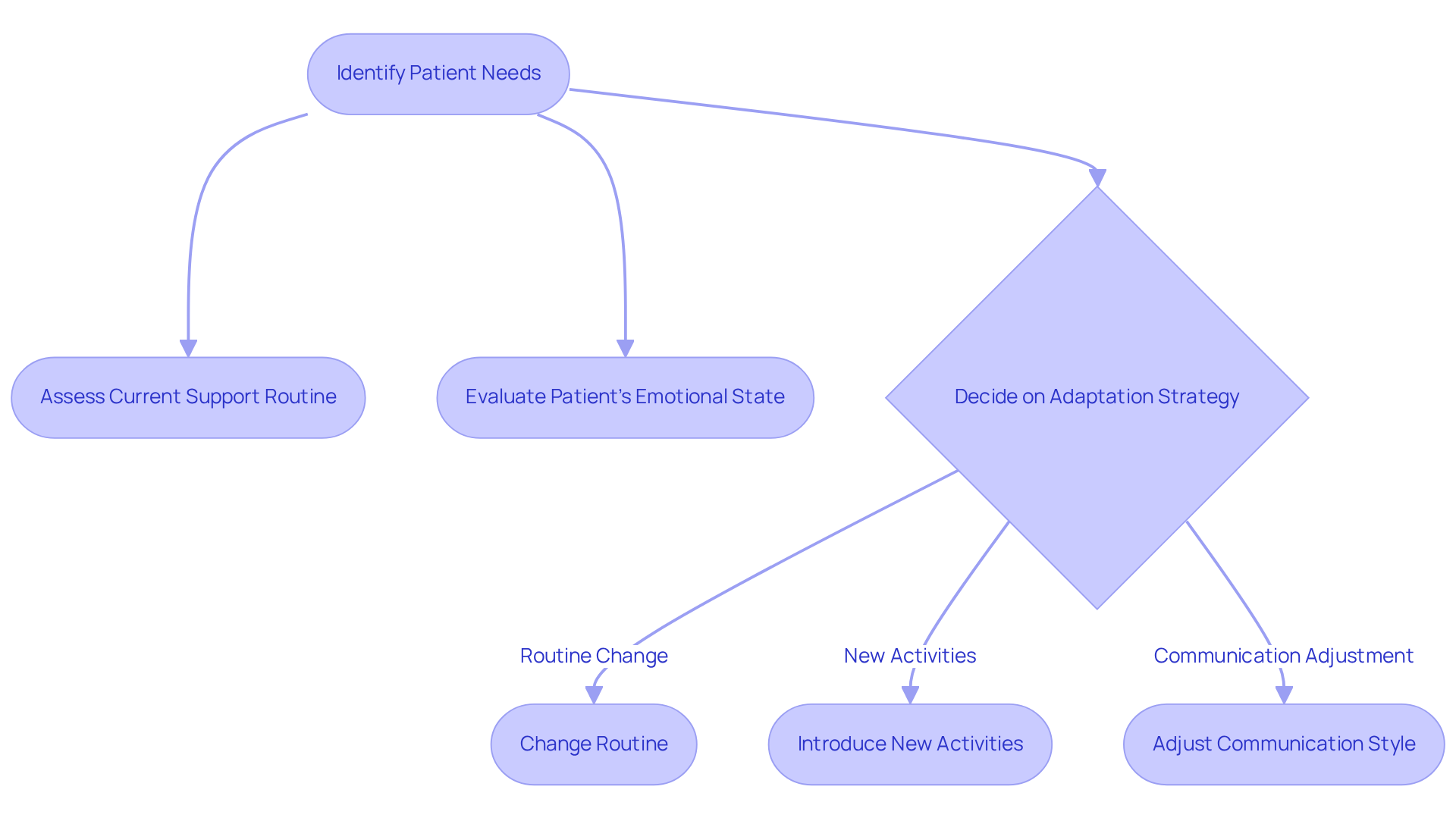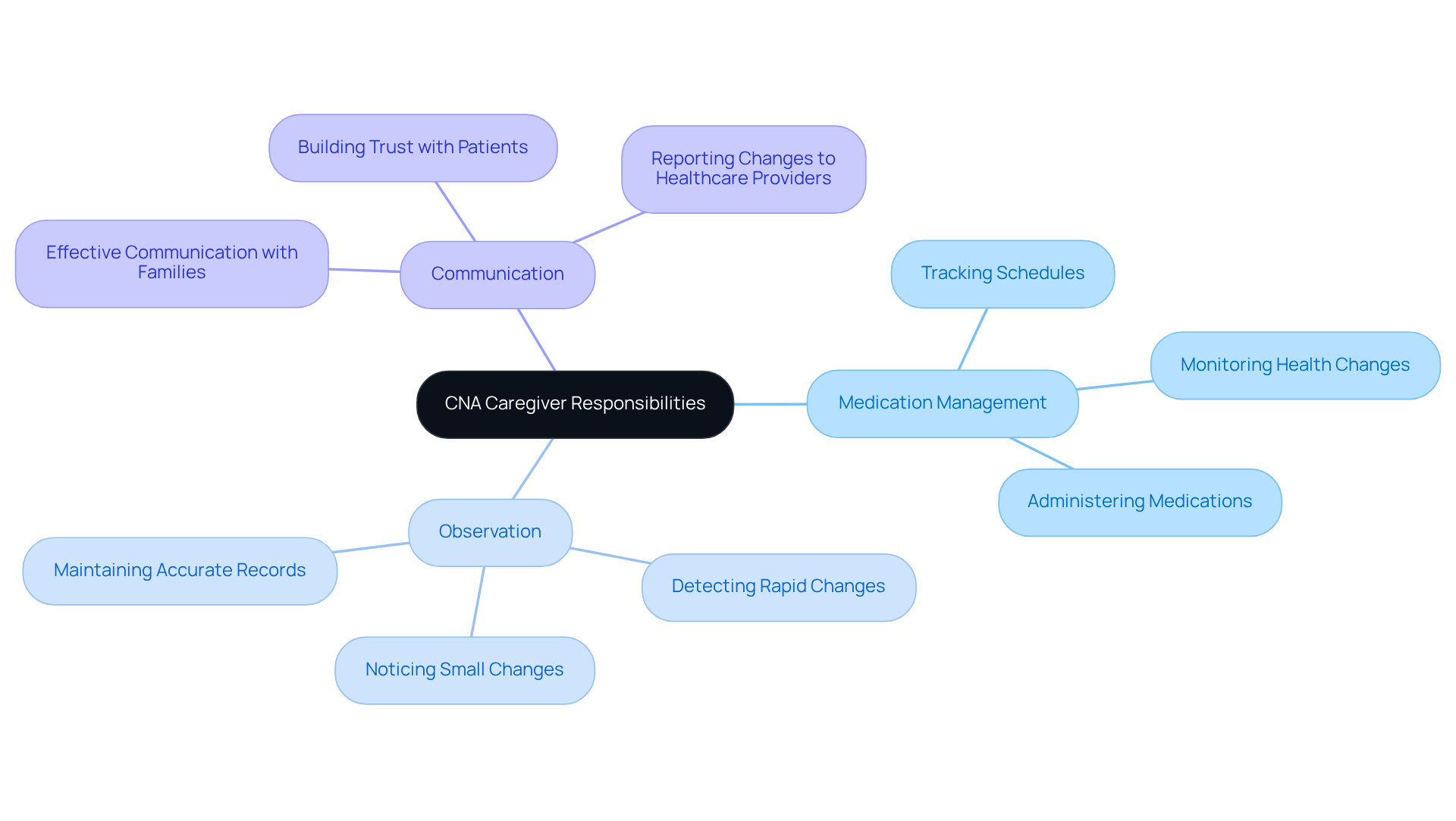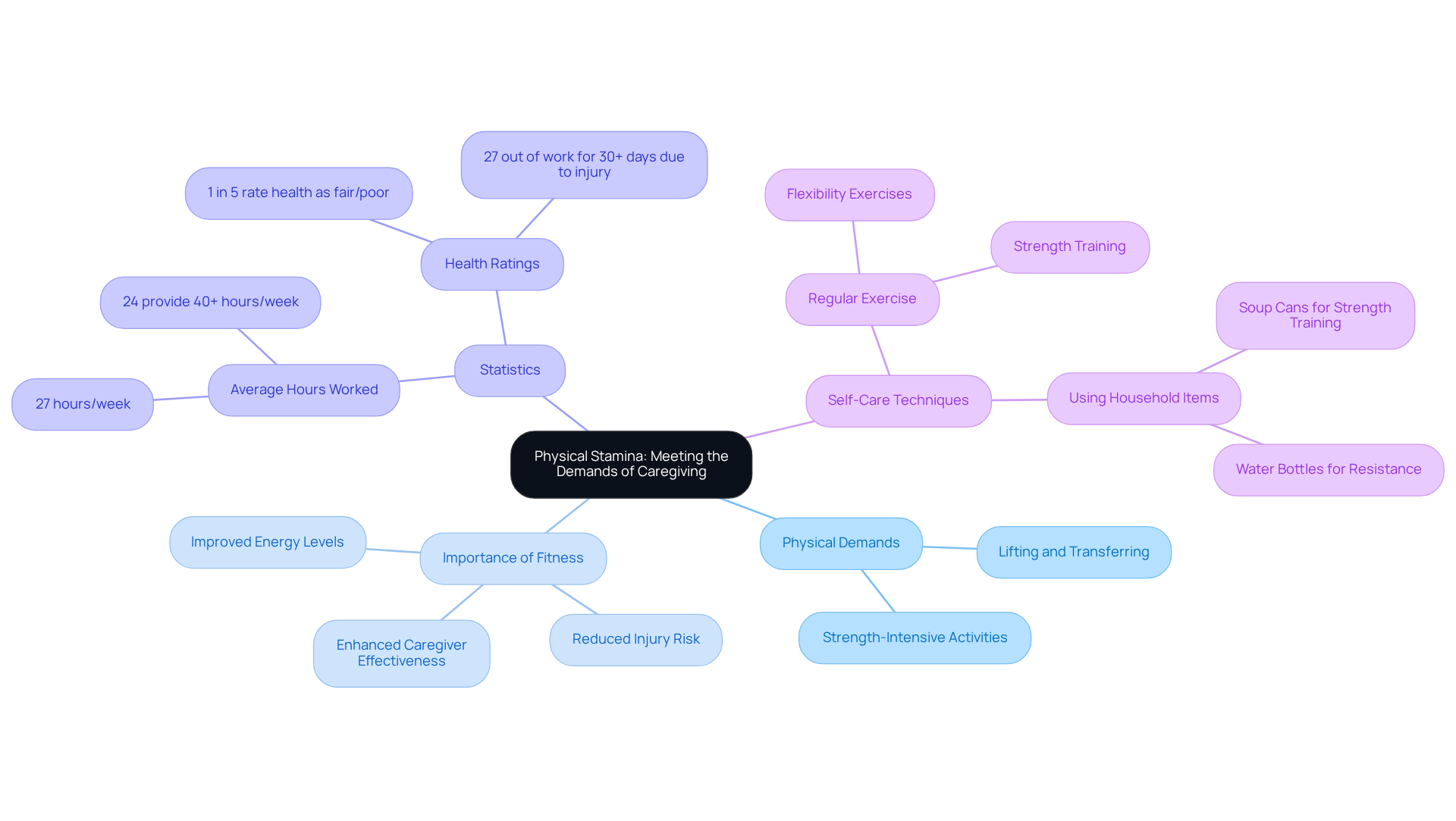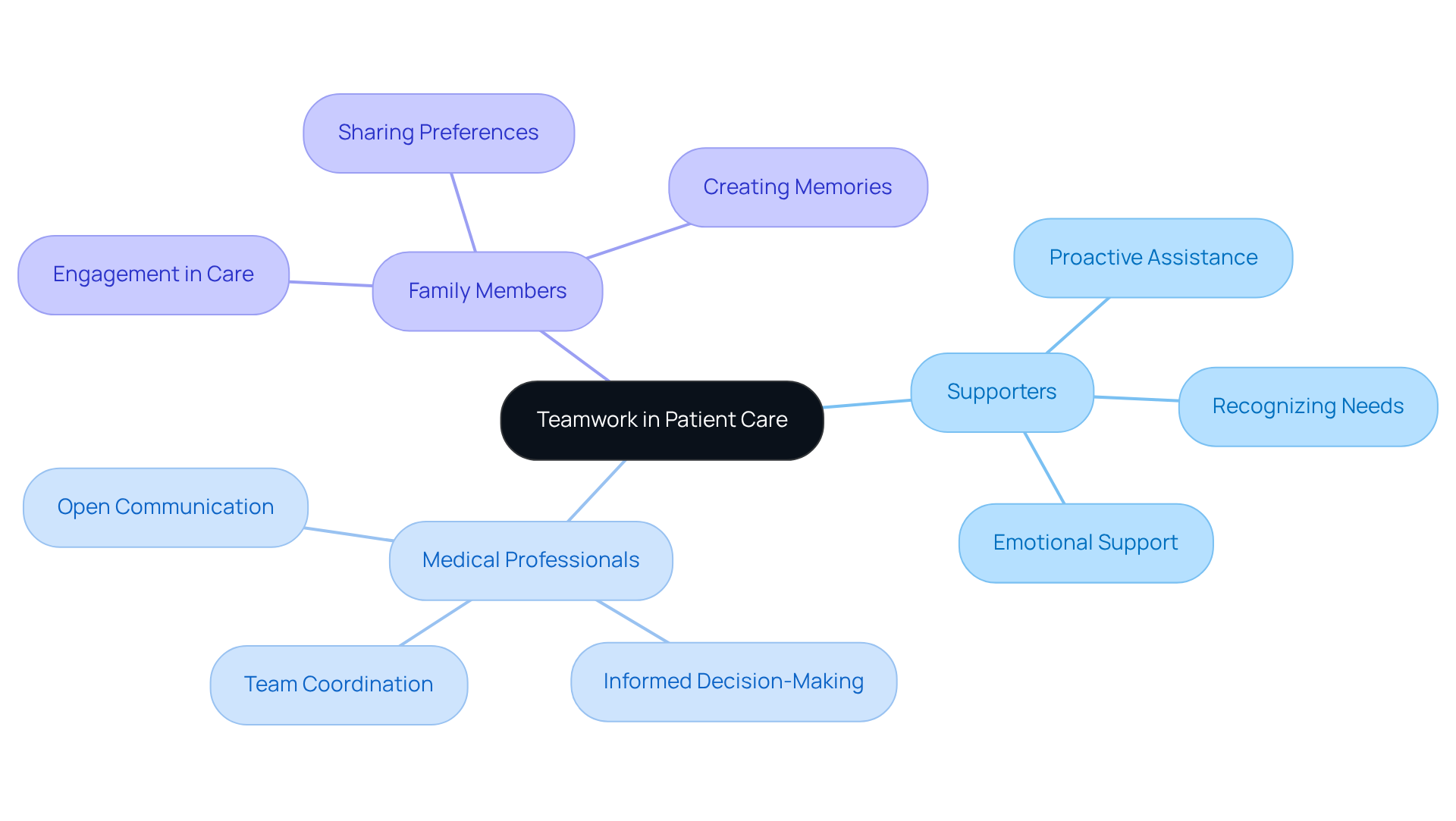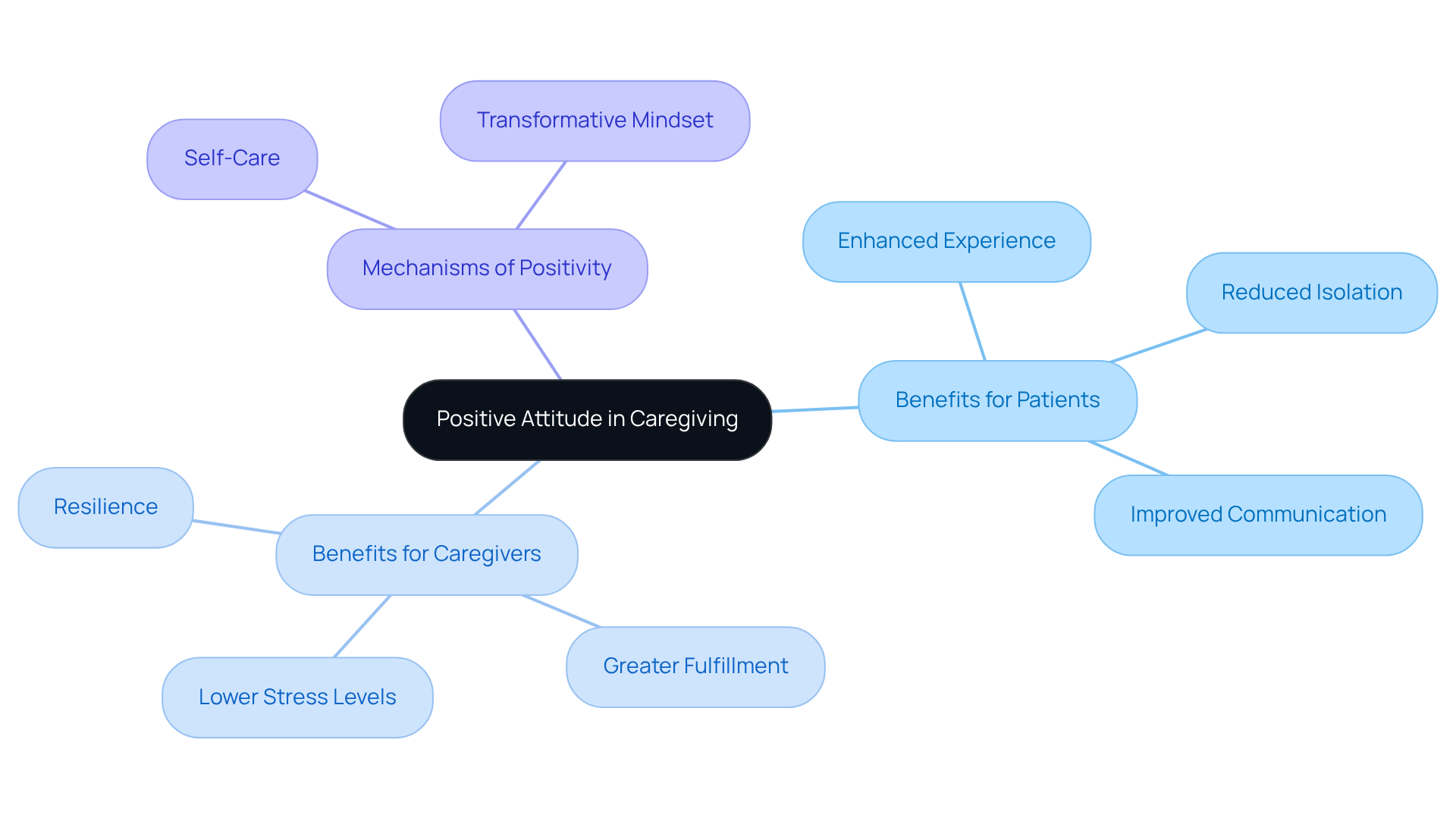Introduction
CNA caregivers truly are the unsung heroes of home healthcare. They provide essential support that significantly impacts the well-being of those they serve. Their roles require not just technical skills but also a unique blend of qualities that foster trust, compassion, and resilience.
This article explores ten essential traits that define effective CNA caregivers. These characteristics not only enhance patient care but also create a nurturing environment. What happens when caregivers embody these qualities? The answer is profound: they make a remarkable difference in the lives of their patients and their families, transforming challenges into opportunities for connection and healing.
Happy to Help Caregiving: Compassionate Care for Patients
At Happy to Help Caregiving, we understand the emotional challenges that CNA caregivers face. The stress and burnout can feel overwhelming, but you’re not alone. We’re here to offer compassionate in-home assistance, focusing on enhancing the quality of life for seniors and individuals with unique needs.
Our approach is all about personalized care that promotes independence and well-being. We believe that everyone deserves support in the comfort of their own home. This commitment to compassionate care is essential for CNA caregivers to build trust and rapport with our clients, laying the foundation for effective caregiving.
Imagine the peace of mind that comes from knowing your loved one is receiving the care they need. Our dedicated team is here to provide not just practical support, but emotional reassurance as well. We’re committed to being a source of comfort and strength for both clients and their families.
Let us help you navigate this journey with empathy and understanding. Together, we can create a nurturing environment that fosters independence and joy.
Empathy: Understanding Patient Needs and Emotions
Empathy stands as a cornerstone of effective caregiving provided by cna caregivers in-home. It allows caregivers to truly recognize and respond to the emotional states of those they care for. This understanding fosters a supportive atmosphere where individuals feel valued and understood. When providers show compassion, they can anticipate individual needs more effectively, leading to better treatment outcomes and greater satisfaction among those receiving support.
Research highlights that compassionate interactions can boost client satisfaction with healthcare services by as much as 52%. This is particularly significant in home environments, where personalized attention is crucial. For example, when a caregiver notices someone displaying anxiety, they can offer reassurance or engage them in a comforting activity, greatly enhancing that person’s emotional well-being.
Moreover, studies indicate that empathy can reduce post-operative pain and anxiety by 20%. This underscores the vital role cna caregivers play in both home care and clinical settings. As Dr. Jeremy Howick emphasizes, enhancing empathy is a simple yet powerful intervention that can significantly elevate satisfaction among individuals receiving care.
By prioritizing compassion, cna caregivers not only enrich individual experiences but also contribute to improved overall health outcomes. This nurturing approach creates a ripple effect, fostering a sense of connection and understanding that is essential in caregiving.
Communication Skills: Building Trust and Clarity
Effective communication skills are vital for CNA caregivers who are providing care. They allow caregivers to share essential information with clarity and compassion. This goes beyond just words; it includes non-verbal cues and active listening techniques. CNA caregivers play a crucial role in helping individuals and their families fully understand treatment guidelines and feel comfortable voicing their concerns.
When a provider takes the time to explain medication schedules thoroughly and addresses any questions, it fosters a sense of security and trust. This nurturing atmosphere significantly increases the likelihood that individuals will follow their care plans, leading to better health outcomes.
Research shows that effective communication practices can reduce misunderstandings and enhance client satisfaction. This strengthens the provider’s role as a trusted ally in the healthcare journey. Remember, every conversation is an opportunity to connect, reassure, and empower those in our care.
Patience: Managing Difficult Situations with Care
Caregiving can be incredibly challenging for cna caregivers, especially when it comes to dealing with an individual’s frustration or confusion. It’s essential for cna caregivers to approach these situations with patience. This quality allows cna caregivers to respond calmly and effectively, which can significantly ease tense moments. For example, when someone resists support, a healthcare provider can take a moment to explain why that help is important. This thoughtful approach not only reduces anxiety but also encourages cooperation, making the caregiving experience more positive for everyone involved.
Research shows that cna caregivers who exhibit patience often enjoy better collaboration from their clients. This strengthens the bond between the provider and the person receiving care. By maintaining a calm demeanor, cna caregivers create an environment where patients feel understood and supported. This nurturing atmosphere contributes to improved health outcomes and emotional well-being for both parties.
Remember, it’s okay to feel overwhelmed at times. You’re not alone in this journey. Many caregivers share similar experiences, and it’s through patience and understanding that we can navigate these challenges together.
Reliability: Consistent Support for Patients
Patients truly flourish in environments marked by consistency, and having dependable providers is essential for their well-being. This dependability manifests in various ways, such as being punctual, sticking to treatment plans, and reliably following through on commitments. For instance, when a supporter arrives on time and attentively follows the established support routine, it fosters a sense of safety and confidence in those they care for.
This reliable assistance not only enhances the quality of life for individuals receiving care but also significantly eases the stress for family members, who often carry the burden of worry about their loved one’s treatment. Research shows that consistent caregiving is vital in reducing the risk of accidents and boosting emotional well-being, especially for individuals facing challenges like Alzheimer’s and dementia. By creating predictable routines, caregivers establish a structured environment that nurtures positive emotional interactions, leading to improved overall moods for patients.
The emotional rewards of caregiving are profound, with 88 percent of American caregivers describing their experiences as deeply fulfilling. As research highlights, “Dependable support services are essential in home environments by providing high-quality, tailored assistance that meets the unique needs of seniors.” This underscores the critical role of reliable CNA caregivers in providing support in home care settings.
Adaptability: Responding to Changing Patient Needs
CNA caregivers often find themselves in situations where they need to adapt their methods to meet the evolving needs of those they are caring for. This might mean changing support routines, trying out new activities to engage someone, or adjusting how they communicate to foster a deeper connection with individuals experiencing cognitive decline.
For example, if a person begins to show signs of increased anxiety, a caregiver might transition from a structured routine to a more flexible and comforting approach. This shift not only addresses the immediate emotional needs of the individual but also helps create a sense of safety and reassurance.
It’s essential to recognize that these adjustments can be challenging. Caregivers may feel overwhelmed or stressed, grappling with the weight of their responsibilities. However, there are resources and support systems available, such as CNA caregivers, to help navigate these emotional hurdles. Connecting with fellow caregivers or seeking guidance from professionals can provide valuable insights and relief.
Remember, you’re not alone in this journey. Many caregivers share similar experiences, and their stories often highlight the profound impact of compassionate care. By embracing flexibility and understanding, CNA caregivers can foster a nurturing environment that truly supports those in their care.
Attention to Detail: Ensuring Patient Safety and Comfort
CNA caregivers play a vital role in ensuring the safety and comfort of those they care for. Their attention to detail in every aspect of assistance is essential. This includes:
- Careful medication management
- Keen observation of daily routines
- Effective communication with individuals and their families
For instance, a health provider who diligently tracks medication schedules and monitors any changes in a person’s condition can quickly spot potential health issues. This proactive approach helps prevent complications and nurtures trust among healthcare providers, patients, and their families.
Moreover, caregivers must possess strong observational skills to detect rapid changes in health conditions. This ability is crucial for providing effective support. Yet, it’s important to acknowledge the emotional challenges caregivers face, such as exhaustion and the heavy burden of responsibility. By prioritizing attention to detail and keeping communication open, CNA caregivers create a supportive environment that enhances overall well-being, ensuring that patients feel secure in their care.
In the words of one caregiver, “Every day brings new challenges, but knowing I can make a difference keeps me going.” This sentiment reflects the heart of caregiving—an unwavering commitment to those in need. Together, let’s recognize the dedication of CNA caregivers and the profound impact they have on the lives they touch.
Physical Stamina: Meeting the Demands of Caregiving
Caregiving can be incredibly demanding for CNA caregivers, both physically and emotionally. Many CNA caregivers find themselves lifting, transferring, and engaging in other strength-intensive activities that can take a toll on their well-being. It’s essential for those providing care to prioritize their physical health through regular exercise and self-care practices.
Engaging in strength training and flexibility exercises not only helps caregivers perform their duties more effectively but also significantly reduces the risk of injury. Imagine feeling more resilient and having the stamina to meet the daily challenges of caregiving. Those who maintain a consistent fitness routine often report improvements in their energy levels, which directly enhances the quality of support they can offer.
Statistics reveal that caregivers dedicate an average of 27 hours each week to caregiving tasks, with 24% committing 40 or more hours. This commitment underscores the importance of focusing on physical fitness. By taking care of their health, CNA caregivers not only benefit themselves but also enrich the overall experience for those they care for.
Self-care routines, such as regular exercise and stretching, are crucial for maintaining both emotional and physical health. It’s concerning to note that one in five CNA caregivers rate their health as fair or poor. This highlights the urgent need for CNA caregivers to prioritize their fitness and well-being.
Incorporating simple techniques, like using household items such as soup cans or water bottles for strength training, can make a significant difference. These small adjustments can empower caregivers, ensuring they are well-equipped to provide compassionate and effective support. Remember, taking care of yourself is not just beneficial for you; it’s a vital part of being able to care for others.
Teamwork: Collaborating for Comprehensive Patient Care
Cooperation among supporters, medical professionals, and family members is essential for providing comprehensive care to individuals. When everyone works together, it opens up channels for sharing insights and strategies that can truly enhance the care experience. For instance, when caregivers maintain open communication with nurses and doctors, they can share vital information about an individual’s daily condition. This exchange of knowledge empowers healthcare professionals to make informed medical decisions, ultimately leading to better outcomes for those in their care.
Support providers also play a crucial role by recognizing when more assistance is needed and spotting early signs of significant medical issues. This proactive approach fosters effective collaboration. Research shows that higher levels of teamwork are strongly associated with improved client-focused service (PCC), underscoring the positive impact of collaboration on individual outcomes.
A collaborative approach creates a supportive environment for caregivers, helping to alleviate feelings of isolation and boosting job satisfaction. By nurturing reliable connections among team members, healthcare professionals can ensure that individuals receive the highest quality of care, tailored to their unique needs and preferences. As Eileen Lawless beautifully puts it, “The collaboration between professional and family supporters guarantees that our loved ones obtain thorough assistance that meets their medical requirements and respects their dignity as individuals.”
To foster teamwork, family supporters should engage in consistent dialogue with healthcare providers, ensuring that everyone involved in the individual’s care is informed and aligned. This ongoing communication not only strengthens relationships but also enhances the overall care experience.
Positive Attitude: Enhancing Patient Experience and Morale
A positive mindset isn’t just beneficial; it can truly transform the support experience for everyone involved. CNA caregivers who approach their roles with optimism and enthusiasm can uplift the spirits of those they care for, making daily interactions not only more enjoyable but also deeply meaningful. For example, when a caregiver maintains a cheerful attitude while assisting with daily activities, it can significantly lessen feelings of isolation or sadness in individuals, fostering a nurturing atmosphere.
This positivity enhances the experience for patients and boosts the professional satisfaction and resilience of support staff. Research shows that caregivers with a positive outlook often experience lower stress levels, which in turn improves their emotional resilience and overall health. Moreover, CNA caregivers who embrace positivity frequently report a greater sense of fulfillment and connection with the individuals they support. A case study titled ‘Transformative Benefits for Recipients’ highlights how a positive mindset encourages better communication and emotional bonds, leading to increased satisfaction with the care provided.
By nurturing a positive mindset, CNA caregivers can turn challenges into opportunities for growth, ultimately enhancing the quality of assistance they offer. Additionally, maintaining a positive attitude is closely tied to self-care, allowing caregivers to recharge and better support their loved ones. Remember, fostering positivity not only benefits those receiving care but also enriches the lives of those providing it.
Conclusion
The essential qualities of CNA caregivers are crucial in providing high-quality, compassionate care that truly enhances the lives of patients and their families. These traits not only define effective caregiving but also nurture trust and empathy, creating an environment that supports individuals during their most vulnerable moments.
Throughout this article, we’ve explored key qualities like:
- Empathy
- Communication skills
- Patience
- Reliability
- Adaptability
- Attention to detail
- Physical stamina
- Teamwork
- A positive attitude
Each of these traits is vital in meeting the unique needs of those they serve, while also promoting the caregivers’ own well-being. Highlighting these characteristics underscores the profound impact that dedicated CNA caregivers have on patient satisfaction, emotional health, and overall quality of life.
Reflecting on the significance of these qualities, it’s clear that fostering a culture of compassion and support is essential in caregiving. By prioritizing these traits, caregivers not only enhance their effectiveness but also create a more positive and fulfilling experience for themselves and those they care for. Embracing these qualities can lead to transformative outcomes in patient care, making it vital for caregivers to continuously develop and embody these essential traits in their daily practice.
As we conclude, let’s remember that the journey of caregiving can be challenging, filled with moments of stress and burnout. Yet, by leaning into these qualities and supporting one another, caregivers can find strength and resilience. Together, we can create a nurturing environment that uplifts both caregivers and patients, ensuring that everyone feels valued and cared for. Your dedication makes a difference, and by embracing these essential traits, you’re not just providing care; you’re fostering hope and healing.
Frequently Asked Questions
What is the main focus of Happy to Help Caregiving?
Happy to Help Caregiving focuses on providing compassionate in-home assistance to enhance the quality of life for seniors and individuals with unique needs.
How does Happy to Help Caregiving support CNA caregivers?
They offer support to CNA caregivers by addressing the emotional challenges they face, such as stress and burnout, and emphasize the importance of compassionate care in building trust with clients.
Why is empathy important in caregiving?
Empathy is crucial as it allows caregivers to recognize and respond to the emotional states of those they care for, fostering a supportive atmosphere that enhances client satisfaction and treatment outcomes.
What impact does compassionate interaction have on client satisfaction?
Research indicates that compassionate interactions can boost client satisfaction with healthcare services by as much as 52%, particularly in home care settings where personalized attention is essential.
How can empathy affect pain and anxiety in patients?
Studies show that empathy can reduce post-operative pain and anxiety by 20%, highlighting the important role of CNA caregivers in improving emotional well-being.
What role do communication skills play for CNA caregivers?
Effective communication skills are vital for CNA caregivers as they help share essential information clearly and compassionately, fostering trust and understanding with clients and their families.
How does effective communication influence health outcomes?
Effective communication can reduce misunderstandings and enhance client satisfaction, significantly increasing the likelihood that individuals will adhere to their care plans and achieve better health outcomes.


